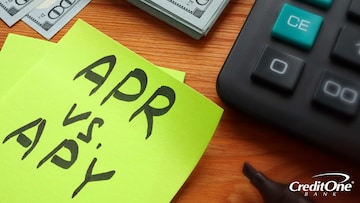Payday Loans: The Hard Truth About Easy Cash
May 02, 2018
Topics:
DebtIf you haven’t been inside one, you’ve almost certainly passed by one. They’re those non-descript buildings typically adorned with brightly colored awnings or neon signs proclaiming “PAYDAY LOANS” to the world. You’ll find them in most towns, large and small, in states where they’re legal. In fact, according to a report by NBC news, there are now more payday lenders in the United States than McDonalds or Starbucks!

If you haven’t been inside one, you’ve almost certainly passed by one. They’re those non-descript buildings typically adorned with brightly colored awnings or neon signs proclaiming “PAYDAY LOANS” to the world. You’ll find them in most towns, large and small, in states where they’re legal. In fact, according to a report by NBC News, there are now more payday lenders in the United States than McDonalds or Starbucks!
But as friendly and inviting as those colorful storefronts look, taking on a payday loan could quickly turn into a frightening scenario if you’re not sure what you’re getting into.
There are now more payday lenders in the United States than McDonalds or Starbucks!
A BRIDGE BETWEEN PAYCHECKS
A payday loan is essentially a short-term, high-interest loan designed to give you enough cash to get by before receiving your next paycheck, typically a two-week period. These loans are mostly for smaller amounts, usually less than $500, with the average payday loan being $430, according to the Center for Financial Services Innovation.
Just how high are the interest rates charged? According to the Consumer Financial Protection Bureau, a typical two-week payday loan with a fee of $15 for every $100 borrowed equates to an annual percentage rate of almost 400%! And that’s “typical”; actual interest rates can be even higher and vary from state to state.
HOW THEY WORK
To get a payday loan, you fill out some paperwork, providing the lender with certain personal and financial information. How much you can borrow is based on your income and other factors—but your credit typically is not one of them, as most payday lenders don’t do a credit check. You then either write the lender a post-dated check for the loan amount plus interest and any other fees, or you give them access to your bank account and permission to electronically withdraw that amount on the loan’s due date. The lender then gives you cash or deposits the loan into your bank account. When the due date arrives, they cash your check or withdraw the money from your account.
If you don’t have enough money in your account to cover the loan amount when it comes due, you may be given the option to just pay a fee or only the interest due and “roll over” the loan, which extends the term of the loan and tacks on more interest. It does nothing, however, to reduce the principal owed. Or you may need to take out another payday loan to pay off the first one. Both of these options can trigger a vicious cycle of snowballing debt from which it can be very difficult to escape.
WHO TAKES OUT PAYDAY LOANS?
A study by the Pew Charitable Trusts found that approximately 12 million Americans take out payday loans each year, costing $9 billion in fees. The average borrower is in debt five months of the year and spends $520 in fees to repeatedly borrow $375. That same report found that the average payday borrower earns roughly $30,000 per year and that 58% of those who take out payday loans have difficulties covering monthly expenses. Seven out of 10 borrowers use payday loans for regular, recurring expenses, not just for emergencies.
What’s particularly alarming is that the average payday loan consumes 36% of a borrower’s gross paycheck, yet most borrowers can afford to devote no more than 5% of their checks to pay back the loan. As a result, the Consumer Financial Bureau found that 80% of payday loans are renewed or followed up with another payday loan within 14 days of taking out the original loan.
Approximately 12 million Americans take out payday loans each year, costing $9 billion in fees. The average borrower is in debt for five months of the year and spends $520 in fees to repeatedly borrow $375.
DO PAYDAY LOANS AFFECT YOUR CREDIT?
Since payday loans do not typically require a credit check, most payday lenders don’t do a “hard inquiry” of your credit report, which can lower your credit score by a few points. Payday lenders also generally do not report the loan to the three major credit reporting agencies.
However, if you fail to pay the loan back in full and on time, a payday loan could adversely affect your credit. If the lender sues you for the outstanding balance, or they sell your loan to a collection agency, either of these actions may be reflected on your credit report and could negatively impact your credit score.
WEIGHING THE PROS AND CONS
To be fair, there wouldn’t be so many payday lenders if they weren’t meeting a need and there was no market for their services. If you need quick, easy cash immediately—say, for a medical emergency or an urgent car repair—a payday loan may be a viable option. But you should first carefully consider the advantages and disadvantages of getting one.
Payday Loan Pros:
- You can get money quickly and conveniently
- You don’t have to have good credit to get the loan
- It will most likely not count as a hard inquiry on your credit report
- It can provide a short-term solution for meeting your financial obligations
Payday Loan Cons:
- Because they’re easy to get, you may be tempted to use them when there are better alternatives
- They are one of the most expensive ways to borrow money
- Fees and interest can quickly snowball, trapping you in a perpetual cycle of debt
- If your check bounces, you will likely be charged additional fees by the lender and overdraft fees by your bank
- If you default on a payday loan, you may be sued or pursued by a collection agency, both of which may show up on your credit report
How much you can borrow is based on your income and other factors—but your credit typically is not one of them, as most payday lenders don’t do a credit check.
CONSIDER OTHER ALTERNATIVES
A payday loan can be a quick solution, but it’s rarely the best one. Before rushing into applying for one of these loans, take a moment to explore other options, including:
Putting off a payment or purchase until you have the
funds, if it’s not a true emergency.Asking a family member or friend to lend you money.
Requesting a payday advance from your employer.
Applying for a lower-interest personal loan or line of credit from a bank.
Trying to negotiate a payment plan with your creditors.
If you have a credit card, using it to pay your expenses—or getting a cash advance with your card if you need cash. Any interest or fees you’ll pay using a credit card are a drop in the bucket compared to the triple-digit interest you could end up paying on a payday loan.
Applying for a credit card and using it to help get you through your financial emergency.
If none of these
But you don’t want to make taking out payday loans your go-to solution for paying your bills. If it is, it’s probably time to make some changes in your behavior rather than continually relying on a temporary solution with the potential to make matters even worse.
Seven out of 10 borrowers use payday loans for regular, recurring expenses, not just for emergencies.
After realizing he couldn’t pay back his outrageous film school student loans with rejection notices from Hollywood studios, Sean focused his screenwriting skills on scripting corporate videos. Videos led to marketing communications, which led to articles and, before he knew it, Sean was making a living as a writer. He continues to do so today by leveraging his expertise in credit, financial planning, wealth-building, and living your best life for Credit One Bank.



